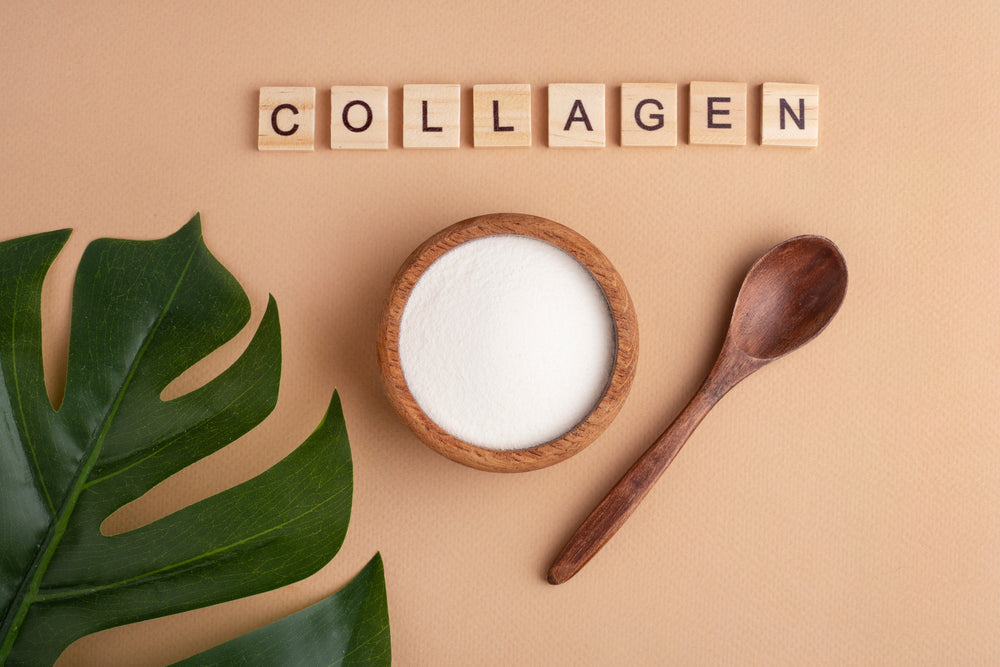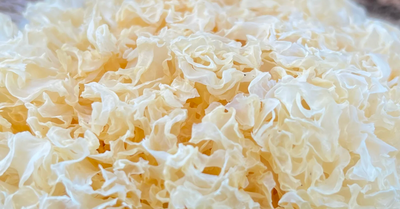
Everything You Need to Know About Collagen

Everything You Need to Know About Collagen
Everything You Need to Know About Collagen
Sometimes it can be confusing to work out which supplements have exactly what role in the body. That’s why in this post we’re going to take you through everything you need to know about collagen, from the different types right through to the benefits of adding it into our diets.
What is Collagen?
Collagen is one of the main proteins in our body, and it is the primary structural protein that you will find in your hair, skin, nails, bones and connective tissue. Think of it as the scaffolding for your body, there to support it as well as providing strength and elasticity to your skin.
As we grow older, our collagen levels naturally start to decline. This is why our skin tends to get looser the older we get and doesn’t bounce back into place as quickly. That’s why it’s really important to start incorporating it into our diets at an early stage, as this will help us to maintain our collagen at a healthy level as we get older.
What are the Different Types of Collagen in the Body?
It may surprise you to hear that we have a whopping 16 different types of collagen in our bodies! Of those 16 types, there are 4 primary ones, which are outlined in more detail below:
- Type I: Makes up around 90% of our bodies’ naturally-occurring collagen stores. Helps to provide structure to our bones, teeth, skin and connective tissues.
Where is Collagen Sourced From?
There are 3 main sources of collagen for supplements: bovine, marine and vegan sources.
Bovine collagen comes from cows, and is typically a blend of type I and type III collagen. It is the most similar to the collagen our own bodies produce, and is also a rich source of several essential amino acids.
Bovine collagen is sourced in a number of different ways, and it’s important to be mindful of this when consuming bovine collagen supplements. Always look to get your bovine collagen supplements from established companies that source their collagen from grass-fed cows that have been humanely raised such as Hunter & Gather's Grass Fed Collagen Peptides or Planet Paleo's Grass Fed Collagen Protein. Not only is this better for your health, as it means the animal hasn’t been given antibiotics and other unnecessary nasties, but it is also better for the health of the environment, as it doesn’t rely on mass farming, which is known for its detrimental effects on the environment.
Marine collagen is a type I collagen, and it is the most easily absorbed of the three, meaning it is widely used in skincare products. It is also a reasonably environmentally conscious option given that it is sourced from the parts of cold-water fish, such as salmon, that would otherwise be thrown away.
Try and always seek out clean, wild-caught options when it comes to marine collagen, as these are far more sustainable. This is something which is typically highlighted on the supplement’s label, so it shouldn’t be too hard to spot. A great product that meets this high criteria include Hunter & Gather's Wild Caught Marine Collagen.
Vegan collagen doesn’t technically exist, as collagen protein consists of a unique set of amino acids that doesn’t naturally occur in plants. However, there are vegan alternatives to collagen supplements that contain nutrients that aid the body’s production of collagen, so there are options, don’t worry!
These collagen boosting nutrients include amino acids, vitamins C and E for collagen production, a B complex to provide cellular energy, or botanical antioxidants to help protect collagen from oxidative damage. Many non-vegan collagen products also include these nutrients too, as they are so useful in assisting with overall collagen health.
What Are the Benefits of Adding Collagen to Your Diet?
Collagen has a whole host of benefits, and it is a super important thing to add into your diet if you can.
Collagen and Skin
The body’s natural collagen is essential in maintaining skin elasticity and a youthful look. Researchers have found that collagen supplements can contribute towards an improvement in skin quality, allowing us to slow down wrinkles and avoid sagging skin. This is because collagen supplements activate skin cells called fibroblasts, which trigger the production of collagen and elastin, which makes the skin stretchier.
Collagen and Hair
Collagen provides several of the amino acids that build keratin, which is the protein that hair is primarily made up of. It can also act as an antioxidant and fight damage caused by free radicals in the body, which can be harmful to hair follicles. Additionally, by consuming collagen, we are improving our skin’s elasticity and strength, thus potentially helping to prevent our hair from thinning.
Collagen and Nails
Collagen supplements have been shown to boost fingernail growth by up to 12%, as well as reducing the frequency of broken nails by up to 42%. Type I and type III collagen are the best collagens for helping our nails, as these are the types of collagen that are responsible for nail growth and maintenance.
Collagen and Sleep Quality
Because collagen supplements are packed with the amino acid glycine, collagen is also thought to help improve our sleep quality. This is because glycine is an inhibitory neurotransmitter that calms our central nervous systems, helping us to unwind and ultimately to fall asleep.
Collagen and Muscle Mass
Collagen is an important component of skeletal muscle, and studies suggest that collagen supplements may be helpful in boosting muscle mass in people with sarcopenia, i.e., the loss of muscle mass we experience as we age. Additionally, collagen supplements may promote the formation of muscle proteins such as creatine, as well as helping to encourage muscle growth after exercise.
If this post has got you wanting to add collagen into your diet, then check out some of these fantastic products to help you fit them in easily. From powders to butters, there’s a collagen supplement for everyone here! You can see our whole collagen range here
By Lola Sherwin









